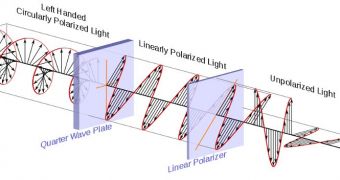Colorado School of Mines scientists have just create a new type of filter for circular polarized light, bringing the goal of having the ability to control all possible polarizations of visible light one step closer to reality. The achievement opens the way for several high-profile applications.
Light filters are obviously nothing new. They are used in everything from sunglasses to the cameras onboard Martian rovers, and have the ability to block out or let pass only certain wavelengths of light.
What researchers have been trying to do for years is develop filters that would allow them to control all possible polarizations of light. Sunglasses, for instance, only block linear polarized light. The new filter is developed specifically for detecting circular polarized light.
With this innovation, the range of polarizations that are still not under researchers' control is vastly diminished. When the ultimate filter is created, soldiers will be able to spot camouflaged enemies, doctors will see through certain layers of the skin, and pilots will see through fog and clouds.
The US Air Force (USAF) provided the funding the CSM needed to conduct this new investigation. Physicists here describe their findings in the January 6 issue of the scientific journal Optics Express.
By using the newly developed circular polarized filter, experts are now able to snap photos through fog, and discover objects that may have been purposefully hidden by perpetrators. The CSM research team was co-led by expert David Flammer, Innovation News Daily reports.
ITN Energy Systems Inc. – a company working with the School to bring the new filter to the market – says that it may be a full year before the first camera featuring such a filter is developed. Still, senior scientist Russell Hollingsworth is convinced that exceeding existing obstacles is just a matter of time.
Moving beyond “worldly” applications, the new light filter could be used by astronomers and astrobiologists in their quest to discover extraterrestrial civilizations on extrasolar planet. If such races exist, then they surely use some form of light for either heat or illumination.
If that is the case, searching for polarized light could reveal their existence a lot faster and more effectively than current methods can. Moving to the field of medicine, there are great hopes that the new filter will improve cancer imaging capabilities.

 14 DAY TRIAL //
14 DAY TRIAL //